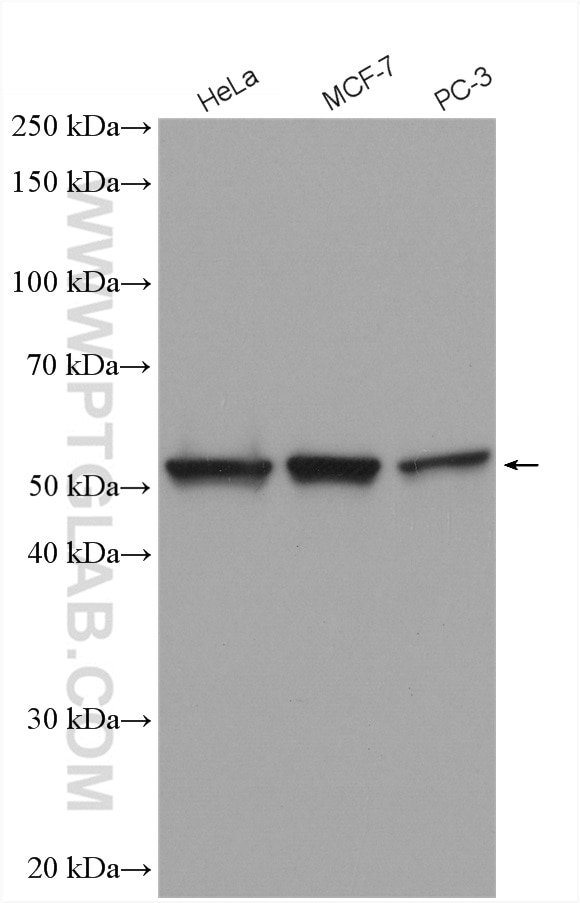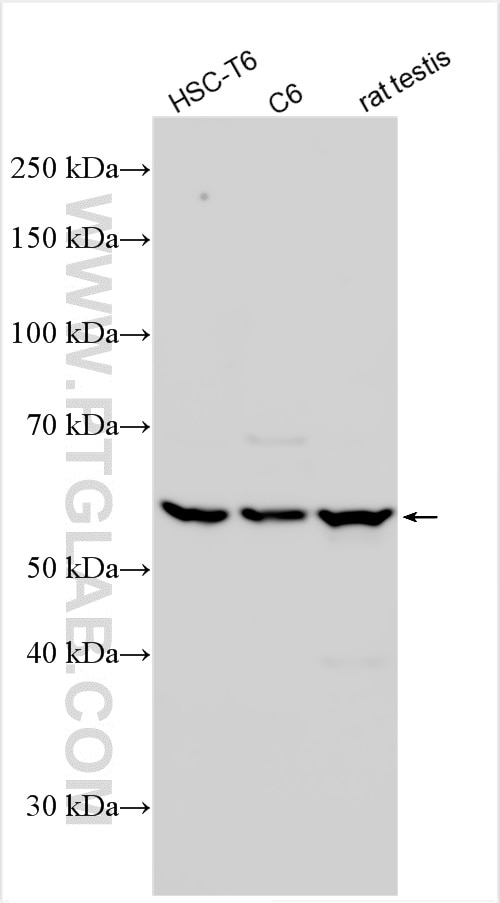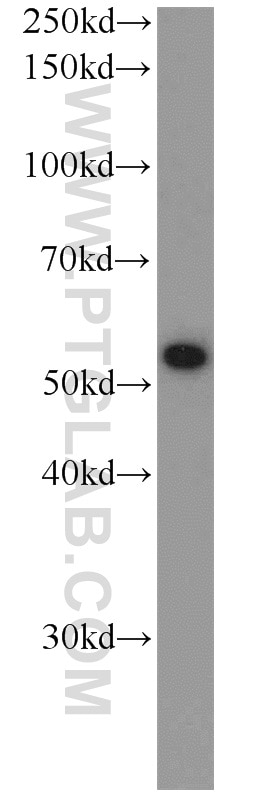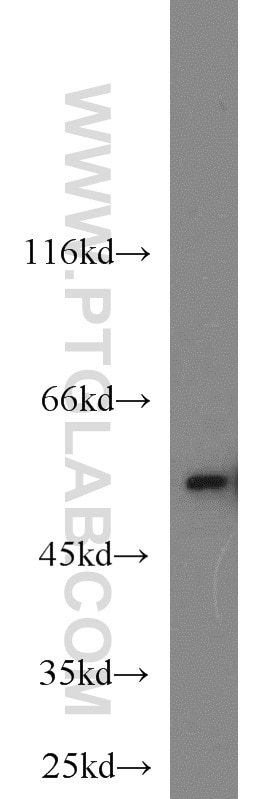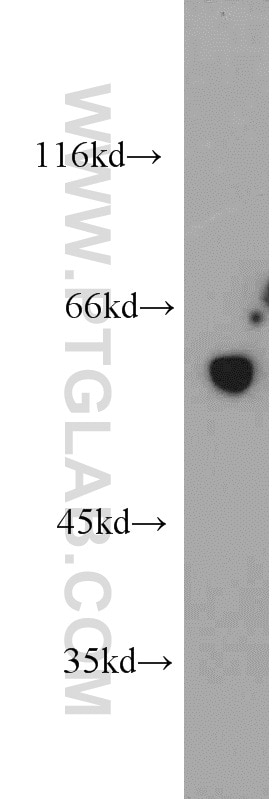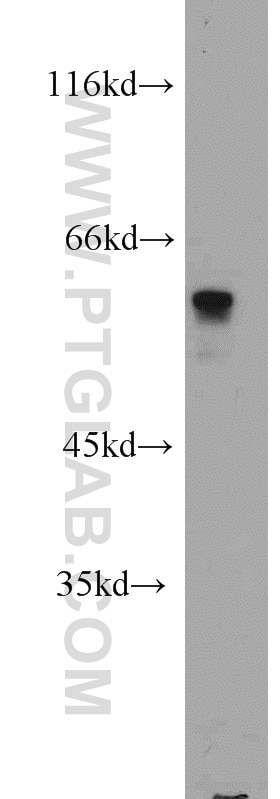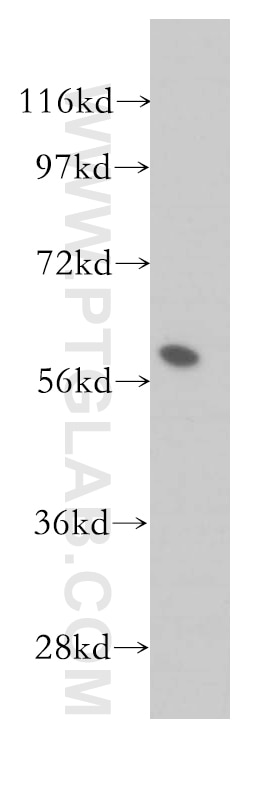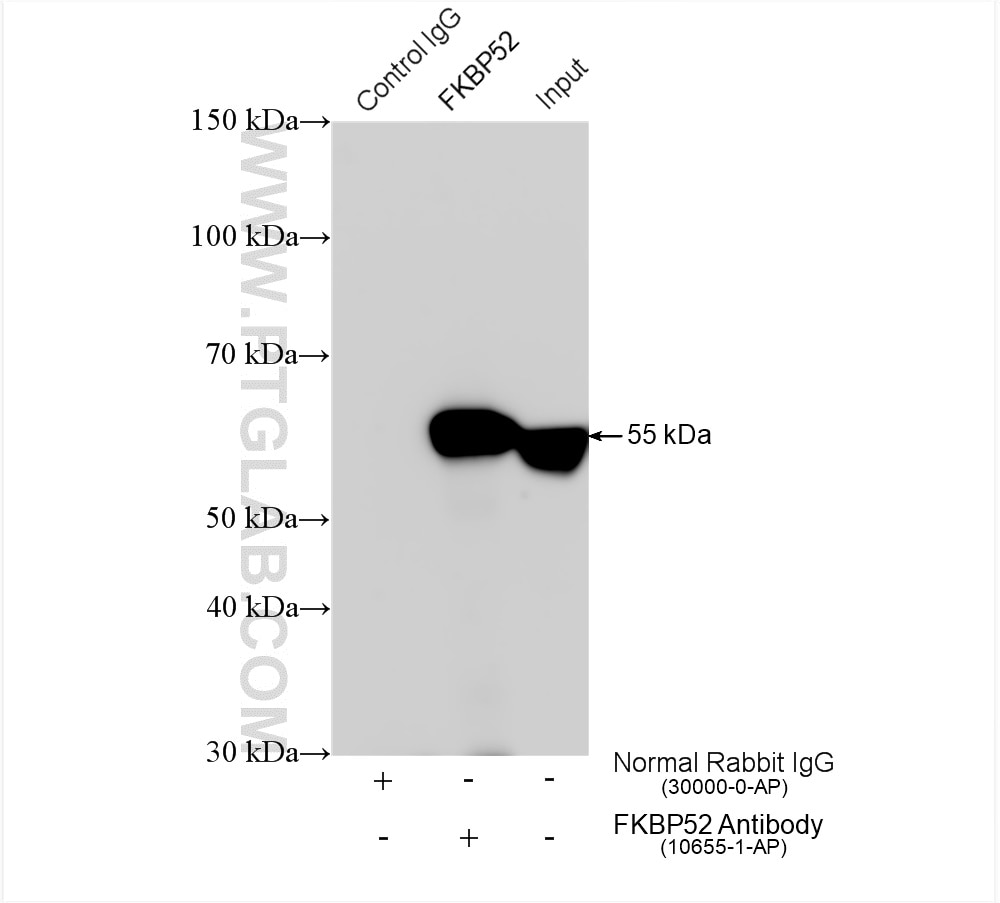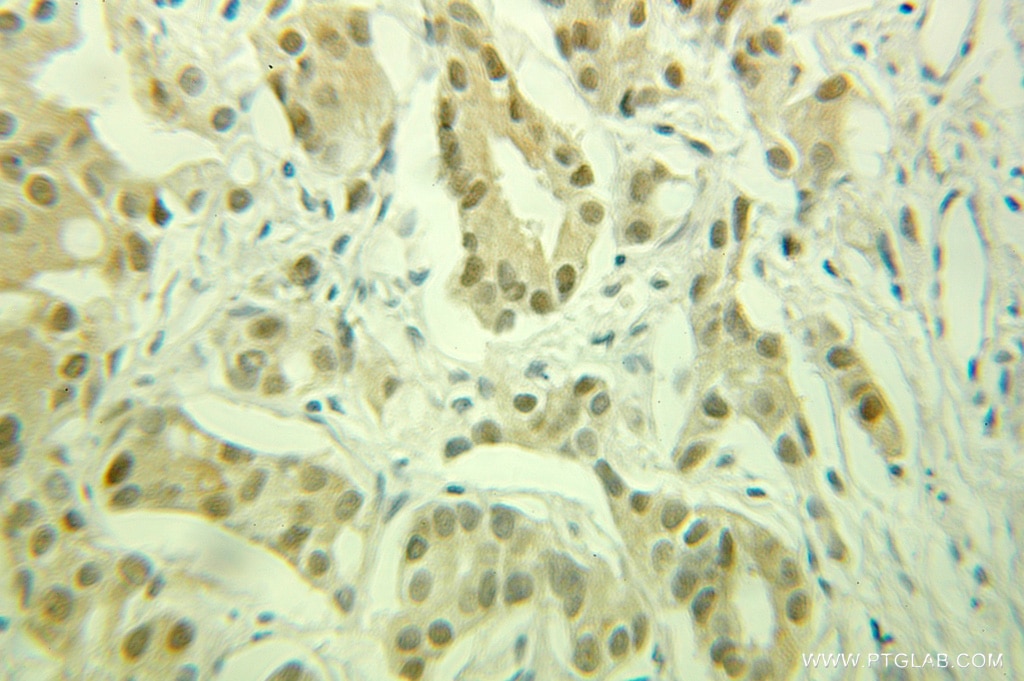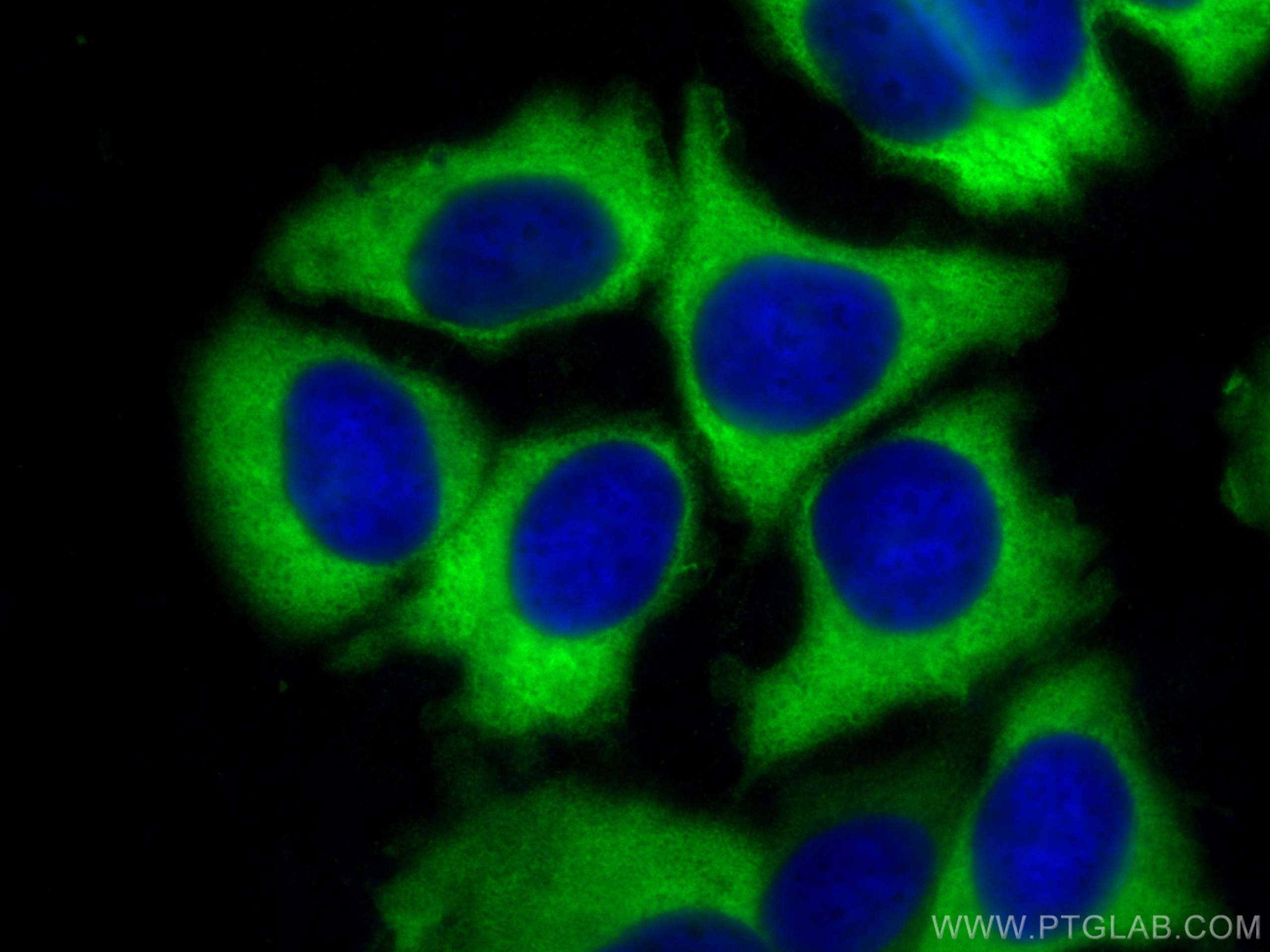Validation Data Gallery
Tested Applications
| Positive WB detected in | HeLa cells, HSC-T6 cells, Jurkat cells, NIH/3T3 cells, PC-3 cells, MCF-7 cells, C6 cells, rat testis tissue |
| Positive IP detected in | HeLa cells |
| Positive IHC detected in | human prostate cancer tissue Note: suggested antigen retrieval with TE buffer pH 9.0; (*) Alternatively, antigen retrieval may be performed with citrate buffer pH 6.0 |
| Positive IF/ICC detected in | MCF-7 cells |
Recommended dilution
| Application | Dilution |
|---|---|
| Western Blot (WB) | WB : 1:1000-1:8000 |
| Immunoprecipitation (IP) | IP : 0.5-4.0 ug for 1.0-3.0 mg of total protein lysate |
| Immunohistochemistry (IHC) | IHC : 1:20-1:200 |
| Immunofluorescence (IF)/ICC | IF/ICC : 1:50-1:500 |
| It is recommended that this reagent should be titrated in each testing system to obtain optimal results. | |
| Sample-dependent, Check data in validation data gallery. | |
Published Applications
| KD/KO | See 5 publications below |
| WB | See 15 publications below |
| IHC | See 4 publications below |
| IP | See 1 publications below |
Product Information
10655-1-AP targets FKBP52 in WB, IHC, IF/ICC, IP, ELISA applications and shows reactivity with human, mouse, rat samples.
| Tested Reactivity | human, mouse, rat |
| Cited Reactivity | human, mouse, rat, chicken |
| Host / Isotype | Rabbit / IgG |
| Class | Polyclonal |
| Type | Antibody |
| Immunogen | FKBP52 fusion protein Ag1019 相同性解析による交差性が予測される生物種 |
| Full Name | FK506 binding protein 4, 59kDa |
| Calculated molecular weight | 52 kDa |
| Observed molecular weight | 52 kDa |
| GenBank accession number | BC007924 |
| Gene Symbol | FKBP52 |
| Gene ID (NCBI) | 2288 |
| RRID | AB_2246853 |
| Conjugate | Unconjugated |
| Form | Liquid |
| Purification Method | Antigen affinity purification |
| UNIPROT ID | Q02790 |
| Storage Buffer | PBS with 0.02% sodium azide and 50% glycerol{{ptg:BufferTemp}}7.3 |
| Storage Conditions | Store at -20°C. Stable for one year after shipment. Aliquoting is unnecessary for -20oC storage. |
Background Information
FKBP52 (FK506 binding protein 4) is a member of the immunophilin protein family that comprises intracellular protein effectors of immunosuppressive drugs, and it is known as a steroid receptor-associated protein. As a novel regulator of microtubule dynamics, FKBP52 is associated with the motor protein dynein and with the cytoskeleton during mitosis. FKBP52 is highly expressed in CNS regions susceptible to Alzheimer's, and plays a role in modulating toxicity of Abeta peptides. The protein can associate with the Tau function, and may help to decipher and modulate the events involved in Tau-induced neurodegeneration. In addition, FKBP52 is likely to play a role in growth and development of the male genitalia.
Protocols
| Product Specific Protocols | |
|---|---|
| WB protocol for FKBP52 antibody 10655-1-AP | Download protocol |
| IHC protocol for FKBP52 antibody 10655-1-AP | Download protocol |
| IF protocol for FKBP52 antibody 10655-1-AP | Download protocol |
| IP protocol for FKBP52 antibody 10655-1-AP | Download protocol |
| Standard Protocols | |
|---|---|
| Click here to view our Standard Protocols |
Publications
| Species | Application | Title |
|---|---|---|
Theranostics FKBP4 connects mTORC2 and PI3K to activate the PDK1/Akt-dependent cell proliferation signaling in breast cancer.
| ||
Clin Cancer Res Identification of a new panel of serum autoantibodies associated with the presence of in situ carcinoma of the breast in younger women. | ||
Mol Oncol FKBP51 and FKBP52 regulate androgen receptor dimerization and proliferation in prostate cancer cells.
| ||
Int J Mol Sci Secretome Analyses Identify FKBP4 as a GBA1-Associated Protein in CSF and iPS Cells from Parkinson's Disease Patients with GBA1 Mutations | ||
J Cell Physiol Multiple roles for peptidylglycine α-amidating monooxygenase in the response to hypoxia. | ||
RNA The co-chaperones Fkbp4/5 control Argonaute2 expression and facilitate RISC assembly.
|
